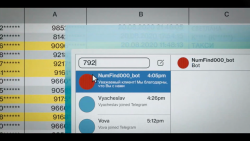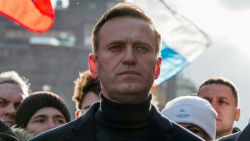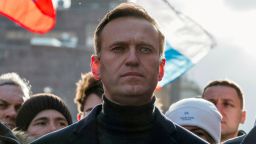A version of this story appeared in CNN’s What Matters newsletter. To get it in your inbox, sign up for free here.
If you want to understand Vladimir Putin’s stranglehold on power in Russia, watch the new film “Navalny,” which premieres Sunday at 9 p.m. ET on CNN.
Russia’s government has gone to great lengths to sideline the opposition leader Alexey Navalny, who was sentenced to prison after surviving a poisoning attempt.
The film documents the improbable detective work that identified the team of Russian spies who hunted and then tried to kill Navalny, as well as his recovery in Germany and return to Russia, where he was immediately arrested.
I talked to one of the investigators who unmasked the spies, Christo Grozev – who works with the investigative group Bellingcat – about his methods, his new mission documenting war crimes in Ukraine and his views about how the ethics of journalism must change to fight government corruption.
Our conversation, edited for length and clarity, is below:
Catching Russian poisoners with digital breadcrumbs
WHAT MATTERS: In the documentary, you put all these pieces together – from telephone numbers to car registrations and so forth – to figure out who poisoned Navalny. How have you and Bellingcat developed this process of investigation? And what made you apply it to Russia in particular?
GROZEV: We started in a different way, by just piecing together social postings in the context of the initial Russian invasion of Ukraine in 2014.
The first investigation that Bellingcat did by just piecing together available pieces of data from the internet was the downing of (Malaysia Airlines) MH17 in July 2014.
At that time, a lot of public data was available on Russian soldiers, Russian spies, and so on and so forth – because they still hadn’t caught up with the times, so they kept a lot of digital traces, social media, posting selfies in front of weapons that shoot down airliners.
That’s where we kind of perfected the art of reconstructing a crime based on digital breadcrumbs. … But as time went by, sort of the bad actors that we were investigating, they started hiding their stuff better. … By 2016, it was no longer possible to find soldiers leaving status selfies on the internet because a new law had been passed in Russia, for example, banning the use of mobile phones by secret services and by soldiers.
So we had to develop a new way to get data on government crime. We found our way into this gray market of data in Russia, which is comprised of many, many gigabytes of leaked databases, car registration databases, passport databases.
Most of these are available for free, completely freely downloadable from torrent sites or from forums and the internet.
And for some of them, they’re more current. You actually can buy the data through a broker, so we decided that in cases when we have a strong enough hypothesis that a government has committed the crime, we should probably drop our ethical boundaries from using such data – as long as it is verifiable, as long as it is not coming from one source only but corroborated by at least two or three other sources of data.
That’s how we develop it. And the first big use case for this approach was the … poisoning of Sergei and Yulia Skripal in 2018 (in the United Kingdom), when we used this combination of open source and data bought from the gray market in Russia to piece together who exactly the two poisoners were. And that worked tremendously.
A ‘multilevel computer game’ vs. the Russian government
WHAT MATTERS: You talked about how your tactics using social media have become dated because the Russians have learned from them. Have you seen that they’ve learned from this use of gray market data?
GROZEV: Absolutely. It has been what I best describe as a multilevel computer game. Every time we use one, of course, the Russian government learns and closes that gap and then we have to outsmart them in the next stage.
So for example, when we first learned that we can get private data, passport files and residence files on Russian spies who go around killing people, they closed the files on those people. So every spy suddenly had a missing passport file in the central password database.
But that opened up a completely new way for us to identify spies, because we were just able to compare older versions of the database to newer versions. So that allowed us to find a bad group of spies that we didn’t even know existed before.
The Russian government did realize that that’s maybe a bad idea to hide them from us, so they reopened those files but just started poisoning data. They started changing the photographs of some of these people to similar looking, like lookalikes of the people, so that they confused us or embarrass us if we publish a finding but it’s for the wrong guy. And then we’ll learn how to beat that.
New journalism needs new ethics
WHAT MATTERS: You talked about dropping your ethical boundaries. Obviously some of your tactics, like the paying of bribes or the use of personal data, is not something that many Western journalists would be allowed to do. Would you say that you veered away from journalism or that the rules of journalism have changed?
GROZEV: Well, first of all, everything changes. Therefore, the rules of journalism should change with the changing times.
And it’s not common that journalism was investigating governments conducting government-sanctioned crimes, but now it’s happening. … With the paradigm of sovereign governments, other governments cannot investigate the Russian government … and the Russian government is not going to investigate itself because it is intending to stay in power forever.
This is not a model that traditional journalism can investigate properly. It’s not even a model that traditional law enforcement can investigate properly.
I’ll give an example. When the British police asked, by international agreement, for cooperation from the Russian government to provide evidence on who exactly these guys were who were hanging around the Skripals’ house in 2018, they got completely fraudulent, fake data from the Russian government. …
So the only way to counter that as a journalist is to get the data that the Russian government is refusing to hand over. And if this is the only way to get it, and if you can be sure that you can prove that this is valid data and authentic data – I think it is incumbent on journalists to find the truth. And especially when law enforcement refuses to find the truth because of honoring the sovereign system of respecting other governments.
The Russian government enables these investigations
WHAT MATTERS: You’re Bulgarian, and you live in Austria. I’m here in the US. Should we be applying these methods to other governments that aren’t Russian?
GROZEV: Well, of course. What is specific about the Russian government that makes it easier to do this kind of journalism there is it has a confluence of two qualities.
One is authoritarianism, which means they love to gather data, comprehensive data, on … what they consider to be their subjects, and therefore there’s a lot of centralized data.
And second, there’s a lot of petty corruption … within the law enforcement system, and this data market thrives on that. And petty corruption exists because that is what an authoritarian government figure like Putin can survive on, because he needs to allow these people to get bribes and get money.
This combination of qualities didn’t exist in every market. In China, for example, there is centralized, concentrated data, but there isn’t the petty corruption that exists in Russia. But there you have whistleblowers who leak this data, and you can bypass corruption but you still get a lot of access to centralized data.
And in other governments, there is just more transparency on data. There’s FOIA (Freedom of Information Act). I think it’s all about trusting data. As opposed to trusting sources. That’s the main shift in the way we do investigations. We just don’t trust sources, as I said in the film as well.
What Russia’s army reflects
WHAT MATTERS: How has the process changed? As you’ve pivoted to Ukraine, has the availability of evidence surprised you?
GROZEV: Well, first of all, each corrupt government is somewhat dysfunctional and is behind the times just because they have different metrics than good governance.
So Russia’s army is a reflection of the overall state of Russian society and governance, and it is mismanaged. … Billions have been spent on creating sophisticated encrypted communications for the military in Russia.
But most of that money has been stolen in corrupt kickbacks, and the result is they didn’t have that functioning system. … So they had to resort to good old telephones, and they were confiscating phones from the locals and using them to make phone calls to their superiors or to their loved ones.
And all of that is easily transparent to the Ukrainians, and they shared all of that with journalists – so that yeah, it’s not unpredictable. It is shocking how incompetent they are. But it was to be expected, because it’s a reflection of 23 years of corrupt government.
How is Bellingcat helping Ukraine?
WHAT MATTERS: How has your operation changed as a result of the war?
GROZEV: We had to make a very hard choice … what is the best impact we can do with our skill set in this war? And we could go in the direction of battling misinformation or counting casualties among the armies on both sides.
But we thought that the best impact will be just to log and archive human rights violations and war crimes in real time, because we have developed the method to do this in a way that preserves this evidence for court use. For judicial use. And we were afraid that every day missed or delayed would mean that a lot of this data will disappear.
So that’s what we’re doing – 95% of what Bellingcat does is just archive, log, verify data and make it available to anyone who wants to prosecute these crimes.
Where should war crimes be prosecuted?
WHAT MATTERS: Ukraine is obviously a government under siege. The International Criminal Court is a flawed institution. What do you think would be the best place to prosecute war criminals?
GROZEV: I think, for one, it should be a global tribunal of sorts, and the principle of universal jurisdiction allows almost any country to prosecute crimes against humanity regardless of where they happen.
I’m very hopeful. I was in The Hague (on Wednesday), and I witnessed 18 different countries come together to consider creating a Joint Investigation Group. Each of them has a separate criminal case against the invader in this case, and each of them has the mandate to prosecute, under their own national jurisdiction, war crimes and crimes against humanity conducted in Ukraine. But they’re coming together and saying let’s do it together. And I think this is the best for them.
How could Putin be overthrown?
WHAT MATTERS: It seems the real solution to all of this is for Putin to be overthrown. You’ve worked on many of these cases. Navalny is in prison. There are the Vladimir Kara-Murza poisonings. He recently returned to Russia and was put in jail. Is there anything that gives you optimism that your investigations or the isolation of Russia because of its invasion of Ukraine is piercing into the larger Russian consciousness?
GROZEV: I think there are two impacts that give me hope, optimism.
One is that especially after the Navalny investigation and the Kara-Murza investigation, a lot of Russians – who didn’t know which side is the good guys and which side of the political spectrum is the bad guys – have figured it out. And they decided, OK, Navalny, Kara-Murza, they were honest, and they were efficient enough to be targeted by Putin. And Putin was running a machine, that killing machine that can one day turn against me as well.
I think that awareness of clarity became widespread – I wouldn’t say universal, but widespread – about a year ago. But then Putin, of course, had to clamp down with more and more restrictions on freedom of speech, and he had to start the war.
This means that he has caused the whole of society – including his elite, including his oligarchs – to pay a price that he can in no way reimburse them for.
And I really think that as much as I would like for the people in the street to overthrow Putin, it’s most likely going to be the elite who is unhappy with the cost he has imposed on them that will do that.
How does a spy hunter hide his data? He doesn’t.
WHAT MATTERS: One last question that is not really related to any of this, but I’m just kind of interested. You have done these investigations tracing people’s openly accessible information. How do you treat your own information? Are you very guarded with your online footprint?
GROZEV: Well, I just try to have nothing to hide because I know that given enough effort and enough funding, and the Russians will allocate all the funding that is needed to get something compromising on Bellingcat … so I don’t even try.
There’s also what they call the “hunter’s syndrome.” All these spies, they think they’re untouchable and they don’t hide their data in the way that they expect others to hide it, and it’s a bit similar with us.
We just think that we’re untouchable. I think it’s a lost cause to try to hide it, and therefore I’m not going to change a phone every day. And yeah, I’m sure they know where I’m at right now and that we’re talking – but that’s fine.


















